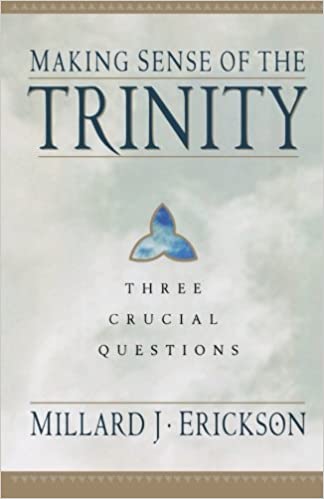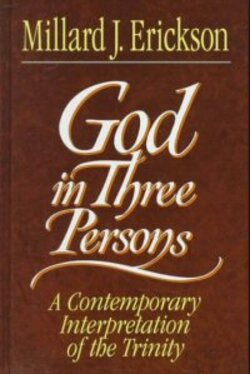Podcast: Play in new window | Download
Subscribe: Spotify | Email | RSS

In this episode, my review of Dr. Millard Erickson’s Making Sense of the Trinity. How many questions about “the Trinity” does this short and often-recommended book clearly answer? The author is very learned, and is not afraid to admit some difficult points for trinitarians, for example:
[The doctrine of the Trinity] does not appear to be taught in Scripture, which is the Christian’s supreme authority in faith and practice. And it presents an obstacle to faith for those who otherwise might be inclined to accept the Christian faith.
Making Sense of the Trinity, p. 13
…most attempts to explain the Trinity have fallen into two major types…[those which] tend toward modalism, that is, the view that God is simply one person, with three different modes of existence…on the other hand [other attempts] tend toward tritheism, that is, the belief in three Gods. I have observed that in practice many Christians tend to alternate between these two positions, and something of this alternation may be a practical necessity.
p. 45
There is no evidence in the New Testament, either in instructions or in practice, of worship and prayer directed to the Holy Spirit. There is, however, considerable indication of a growing practice, as early as the third and fourth centuries. This became more firmly established as time went on.
p. 83
I understand him to be suggesting a four-self Trinity theory in this book, on which each “Person” of the Trinity is a self, and so is the Trinity. Any of those four can and should be objects of prayer and of worship, in his view. Topics discussed in this podcast include:
- Several positive features of this book, and some of his deep insights.
- How this book strongly reflects the intellectual fashions of its time (2000).
- His peculiar view that each Person of the Trinity depends on each of the other two for his existence and deity, and his denial of tradition “divine processions” speculations.
- How the book reveals four “dirty little secrets” of present-day academic theologians.
- Which questions about the Trinity this book answers and which it fails to answer.
- The strong and weak points of this book’s treatment of early Christian views on the Father, Son, and Spirit.
- How this 2000 book differs from Erickson’s 1995 book God in Three Persons on the question of whether or not there is a Trinity doctrine taught in Scripture.
- How Erickson’s approach to “the Trinity” is more Protestant than that of many others.
- How this book answers seven of the nine applicable Advanced Questions about “the Trinity.”
- The minimal use Erickson makes of appeal to “mystery” in this book.
- What sorts of people I think would or would not significantly benefit from this book.
Links for this episode:
podcast 314 – 10 Fundamental Questions about the Trinity

Making Sense of the Trinity: Three Crucial Questions
God in Three Persons: A Contemporary Interpretation of the Trinity
Evolution of the Trinity – with Bill Schlegel
podcast 167 – Lamson’s History of The Unitarian Congregationalists
“Trinity” (Stanford Encyclopedia of Philosophy)
McIntosh’s Four-Self Trinity theory
podcast 78 – Mr. Chad McIntosh on the Trinity as a Functional Person
podcast 44 – The Spiritual Journey of Sir Anthony Buzzard
new co-authored paper: “Dormant Dispositions, Agent Value, and the Trinity”
“On the Possibility of a Single Perfect Person”
podcast 58 – We can’t prove the Trinity by reason alone
podcast 189 – The unfinished business of the Reformation (published book chapter)
10 steps towards getting less confused about the Trinity – #6 get a date – part 2
podcast 260 – How to Argue that the Bible is Trinitarian
podcast 248 – How Trinity theories conflict with the Bible
podcast 191 – Ware’s Outline of the Testimony of Scripture Against the Trinity
Theories of Religious Diversity
podcast 308 – Channing’s “Unitarian Christianity” – Part 1
podcast 302 – The Stages of Trinitarian Commitment
This week’s thinking music is “Dream Blaze” by Little Glass Men.

Hi Tuggy, have you by any chance looked into the christology of Aphrahat?
No, I have not. Why do you ask?
Because Aphrahat seems to have a kind of BU christology (see his 17th Demonstration) and there’s some scholars who tend to think so as well. So I was wondering if you knew about this.
Do we need a formal, rigorous, philosophical definition of the Trinity in order to believe in it?
It would appear not because that is not what the bible gives us is it?
Unless you count 1 John 5 v 7 which is about as close as we get to it. Why not? I personally believe that the King James Version constitutes the divinely preserved words of God true to the divinely inspired original.
No, but you may just be nodding your head to words, rather than believing a theology. What is so special about the KJV in your view?
I don’t believe in eternal generation or procession myself.
I don’t believe that God is Father or Son in any way before God creates anything. These are relational names towards created things.
In my view there must be some kind of necessary eternal “personal”, for want of a better word, relation between God the Logos and God not the Logos. This is necessarily implied from John 1 v 1.
Would the incarnation be possible if this were not the case? Hardly in my view.
Talk of a fourth self seems amusing to me. How would the bible support such a view?
Dale: “So usually, they will try to show that what Scripture *does* say logically implies “the Trinity.” That doesn’t work, so some of the most sophisticated scholars say instead that “the Trinity” is not part of the contents of Scripture, BUT it best explains what is and is not there.”
According to the reformed creeds it does work. Without any help from the outside but based solely on the scriptural text itself. My own humble opinion is that the reformed creeds truthfully reflect what scripture is saying as far as I can judge that with my own intellect.
e.g. Three forms of Unity:
“Article VIII. God Is One in Essence, Yet Distinguished in Three
Persons
According to this truth and this Word of God, we believe in one only God, who
is the one single essence, in which are three persons, really, truly, and eternally
distinct according to their incommunicable properties; namely, the Father, and
the Son, and the Holy Spirit.
Hello, Mr. Tuggy. Great podcast as always. You seem very well read in both Unitarian and Trinitarian works, and I’m curious which books you’d recommend as the best explanation and representation of the Trinity? Having been raised Oneness and now a Unitarian, I realize I’m not familiar enough with general Trinitarian theology, so technically I’m not qualified to speak against it. I understand that there are many different views on the Trinity, so perhaps this isn’t an easy question, but I’d appreciate any of your recommendations.
Hi Chloe – thanks for your comment! Very glad that the podcast has been helpful to you on your journey towards theological truth! A key thing to understand is that there is no one Trinity theology. See podcasts 232 and 302 (@YouTube) for how, sociologically, the trinitarian world functions given that fact. I would recommend my short book What is the Trinity? https://www.what-is-the-trinity.com/ It was written as an invitation for trinitarians to think about Trinity theories, and it tells you where in history they get started. Better yet, read it with a friend and discuss – it is very accessible. Next, if you really want to delve into the confusing world of Trinity theories, this is the place to go: https://plato.stanford.edu/entries/trinity/ You can get a printable pdf via the Friends of the SEP but I think you may have to make a small donation. You could also try printfriendly.com – that may work. And don’t neglect the additional supplements there on History of Trinitarian Doctrines and Unitarianism. To be honest, this stuff is harder to read; it’s directed more and Philosophy or Theology students and professors. But at least it’s free! It’ll cost you some aspirin for the resulting headache though. 🙂 But in all seriousness, many trinitarians really don’t have much of an interpretation of the official language. The main “Trinity” entry concerns very smart, very well-educated trinitarians who are really trying to find a sensible view there. They almost always seriously neglect the Bible, though – see podcasts 189 or 191 for the evidence they neglect as they try to defend catholic traditions. Finally, this presentation – again, I recommend the video so you can see the slides https://trinities.org/blog/podcast-260-how-to-argue-that-the-bible-is-trinitarian/ may help you to see what claims “the Trinity” is supposed to include, and how trinitarians try to show that it is implied by the Bible. 99% of them admit that “the Trinity” is not *explicitly* taught in Scripture – there just aren’t the right words there. So usually, they will try to show that what Scripture *does* say logically implies “the Trinity.” That doesn’t work, so some of the most sophisticated scholars say instead that “the Trinity” is not part of the contents of Scripture, BUT it best explains what is and is not there. Meanwhile some honest Roman Catholic scholars will say that “the Trinity” simply isn’t taught in the Bible (period) – but that’s OK, as they base their trinitarianism on later Church traditions. Anyway, I hope that’s helpful to you. God bless, Dale
Curious if you’d do a review of “The Trinity Hurdle” by Ruth Sutcliffe based on these questions?
I would consider it. Haven’t read it – have you? Are you a unitarian or a trinitarian? What’d you think of it?
Comments are closed.